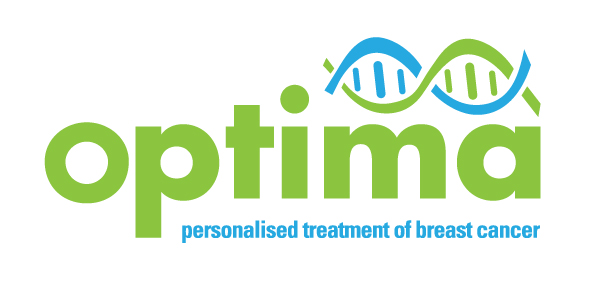Summary of OPTIMA prelim
People often receive chemotherapy after they have had surgery to remove their breast cancer. Chemotherapy can be a life-saving treatment. But not everyone benefits from it. In fact, only a minority of people who receive this treatment need it. This is because many people have already been cured by their surgery, or by the hormonal therapy that they will receive afterwards. Unfortunately our current technology does not allow us to pick out the patients who need the chemotherapy, so we have to treat many patients to benefit a few. Chemotherapy is time consuming, unpleasant and tiring, can have serious or even dangerous complications and for some patients it leads to long-lasting effects on health and wellbeing.
The OPTIMA prelim trial was designed to find out if new technology can help decide who needs chemotherapy. At the moment, doctors make chemotherapy decisions by measuring the size of the tumour, finding out if any lymph nodes are involved, and seeing how active the tumour cells look under a simple microscope. Over the past ten years there has been intense laboratory research to look more deeply into the biology of individual cancer cells, to see which genes are switched on. This research has led to the development of several competing tests, which include Oncotype DX™ and Prosigna™(PAM50), among several others. These tests were developed in the laboratory and then evaluated by looking back at stored breast cancer tissues from patients who were treated in chemotherapy trials 20 years ago. It seems that they can pick out patients who have a high risk of disease recurrence and who therefore need chemotherapy. The tests are only used for patients who have breast cancer which is hormonally sensitive (ER positive) and does not require treatment with Herceptin (HER2 negative).
This basic research now needs to be translated from the lab bench into the clinic. Oncologists around the world are encouraged by these early developments, which may lead to more accurate treatment decisions. The preliminary data certainly looks promising. But to make sure the tests work reliably, they need to be examined in a careful randomised trial, in which test-directed decision making is compared to the current treatment.
OPTIMA prelim was the first part of such a trial. It was a feasibility study of 313 patients with recently diagnosed breast cancer treated in 35 hospitals. It was a randomised trial. All the patients in the control arm received chemotherapy. In the investigational arm, the decision to give chemotherapy was based on the result of an Oncotype DX™ test. If the patient had a low or intermediate score, then chemotherapy was not given.
There were three goals for OPTIMA prelim. (1) Check that the NHS could deliver these new tests quickly and efficiently in standard clinics across the UK. (2) Show that patients and doctors were comfortable with these tests for chemotherapy decisions, and willing to enter a randomised trial. (3) Find out which one of the available tests would be the most effective.
OPTIMA prelim met these three goals, so a much larger trial is being undertaken, OPTIMA-main. This trial will involve 4,500 patients in over 100 UK hospitals, and provide the final proof we need for this new test technology. If the OPTIMA trial proves that these tests are effective, then they would be used in daily clinical practice, bringing more accurate decision making to thousands of women, and ensuring that chemotherapy is given only to those who need it.
OPTIMA prelim opened in September 2012 and by May 2014 the recruitment target had been achieved. This showed that patients are willing to trust these new tests for their treatment decisions. The testing was performed quickly and did not delay decisions, proving that these tests can be used safely in busy NHS hospitals. 80% of patients randomised to test directed decision making were able to avoid chemotherapy, which is a considerable improvement on current practice. OPTIMA prelim included research with patient focus groups, and interviews of both staff and patients. This research provided insights into how patients feel about making informed decisions in breast cancer clinics, and how to improve the quality of information provided.
Although Oncotype DX™ was the main test for decision making in OPTIMA prelim, the breast cancer samples were also tested with all available alternative tests (Oncotype DX™, Prosigna™(PAM50), Mammaprint™, Mammatyper™, NexCourse Breast™ (IHC4-AQUA) and IHC4) in one of the most detailed head-to-head comparisons of the different competing tests. A rigorous analysis was then performed which showed that the Prosigna™ test should be taken through to the main OPTIMA trial.
Having successfully completed all of its original goals, OPTIMA prelim is now closed. It has paved the way for the full OPTIMA trial.

The content of this page has been reviewed and approved by the South East Coast - Surrey Research Ethics Committee.
